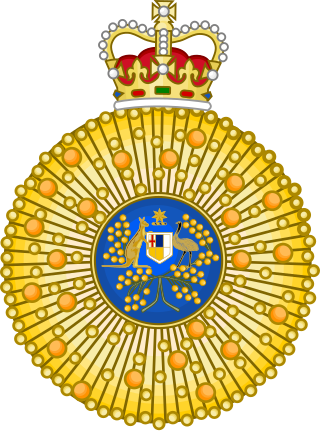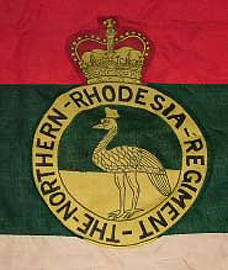
Rhodesia, officially from 1970 the Republic of Rhodesia, was an unrecognised state in Southern Africa from 1965 to 1979, equivalent in territory to modern Zimbabwe. Rhodesia was the de facto successor state to the British colony of Southern Rhodesia, which had been self-governing since achieving responsible government in 1923. A landlocked nation, Rhodesia was bordered by Botswana to the southwest, Mozambique to the east, South Africa to the south, and Zambia to the northwest. From 1965 to 1979, Rhodesia was one of two independent states on the African continent governed by a white minority of European descent and culture, the other being South Africa.

The Order of Australia is an honour that recognises Australian citizens and other persons for outstanding achievement and service. It was established on 14 February 1975 by Elizabeth II, Queen of Australia, on the advice of the Australian Government. Before the establishment of the order, Australian citizens received British honours.

The Most Excellent Order of the British Empire is a British order of chivalry, rewarding contributions to the arts and sciences, work with charitable and welfare organizations, and public service outside the civil service. It was established on 4 June 1917 by King George V and comprises five classes across both civil and military divisions, the most senior two of which make the recipient either a knight if male or dame if female. There is also the related British Empire Medal, whose recipients are affiliated with, but not members of, the order.

Southern Rhodesia was a landlocked self-governing British Crown colony in southern Africa, established in 1923 and consisting of British South Africa Company (BSAC) territories lying south of the Zambezi River. The region was informally known as south Zambesia until annexed by Britain at the behest of Cecil Rhodes's British South Africa Company, for whom the colony was named. The bounding territories were Bechuanaland (Botswana), Northern Rhodesia (Zambia), Portuguese Mozambique (Mozambique), and the Transvaal Republic.
The Australian honours and awards system refers to all orders, decorations, and medals, as instituted by letters patent from the Monarch of Australia and countersigned by the Australian prime minister at the time, that have been progressively introduced since 14 February 1975. The Australian honours and awards system excludes all state and local government, and private, issued awards and medals.

The British South Africa Police (BSAP) was, for most of its existence, the police force of Southern Rhodesia and Rhodesia. It was formed as a paramilitary force of mounted infantrymen in 1889 by Cecil Rhodes' British South Africa Company, from which it took its original name, the British South Africa Company's Police. Initially run directly by the company, it began to operate independently in 1896, at which time it also dropped "Company's" from its name. It thereafter served as Rhodesia's regular police force, retaining its name, until 1980, when it was superseded by the Zimbabwe Republic Police, soon after the country's reconstitution into Zimbabwe in April that year.

The Rhodesian African Rifles (RAR) was a regiment of the Rhodesian Army. The ranks of the RAR were recruited from the black African population, although officers were generally from the white population. The regiment was formed in May 1940 in the British colony of Southern Rhodesia.
Gerald Bryan Sheil O'Cleary Clarke was a Rhodesian politician. He was born in Gwelo as the son of Irish-Rhodesian parents, Francis Joseph Sheil O'Cleary Clarke and Margaret Shiel. His father arrived in Rhodesia in 1896 following a part played in the Jameson Raid, and became a Justice of the Peace in a long career of public service in Rhodesia that stretched for 38 years.
The Rhodesian honours system was established at the time that Rhodesia unilaterally declared itself a republic in March 1970, when a system of military and civil decorations and awards was instituted by Presidential Warrant in November 1970.
The Legion of Merit was a Rhodesian order of merit awarded to both civilian and military recipients for service to Rhodesia.

The Rhodesia General Service Medal was the most widely awarded military medal of Rhodesia. It was awarded to members of the security forces and British South Africa Police for service on operations undertaken for the purpose of combatting terrorists or enemy incursions into Rhodesia.

The Rhodesia Medal was initiated by the British Government in consultation with Australia, New Zealand, Fiji and Kenya, whose forces took part in Operation AGILA. The role of the multi-national force was to keep peace between 22,000 guerrilla fighters and the Rhodesian forces during the ceasefire and run-up to the 1980 elections.

The Rhodesian Security Forces were the military forces of the Rhodesian government. The Rhodesian Security Forces consisted of a ground force, the Rhodesian Air Force, the British South Africa Police, and various personnel affiliated to the Rhodesian Ministry of Internal Affairs. Despite the impact of economic and diplomatic sanctions, Rhodesia was able to develop and maintain a potent and professional military capability.

A double referendum was held in Rhodesia on 20 June 1969, in which voters were asked whether they were in favour of or against a) the adoption of a republican form of government, and b) the proposals for a new Constitution, as set out in a white paper and published in a Gazette Extraordinary on 21 May 1969. Both proposals were approved. The country was subsequently declared a republic on 2 March 1970.

The Rhodesia Regiment (RR) was one of the oldest and largest regiments in the Rhodesian Army. It served on the side of the United Kingdom in the Second Boer War and the First and Second World Wars and served the Republic of Rhodesia in the Rhodesian Bush War.

The Southern Rhodesia Service Medal 1939–1945 was a campaign medal of the British Commonwealth. It was awarded to members of the Southern Rhodesia Defence Forces for home service during World War II.

The Northern Rhodesia Regiment (NRR) was a British Colonial Auxiliary Forces regiment raised from the protectorate of Northern Rhodesia. It was formed in 1933 from elements of the Northern Rhodesia Police, which had been formed during Company rule in 1912. Made up of black other ranks and white officers, its motto was "Different in Race, Equal in Fidelity". This motto may have been adopted following native African porters during the First World War being recognised and compensated as couriers by the British.

The Medal for the Best Shot in the British Army, Infantry, was instituted by Queen Victoria in 1869 and was awarded annually from 1870 to 1882 to the best shot of the Infantry of the British Army, including the Royal Engineers and the Colonial Corps.
The Police Medal for Meritorious Service was a medal in the Republic of Rhodesia awarded to police officers for Meritorious Service.

Captain Chris F. Schulenburg is a South-African born former Rhodesian Army soldier. He is one of only two recipients of the Grand Cross of Valour, Rhodesia's highest military honour and also received the Silver Cross of Rhodesia. Schulenburg received the Grand Cross of Valour in 1978 for an action in which he penetrated an enemy position before returning to his unit and leading a successful assault.















